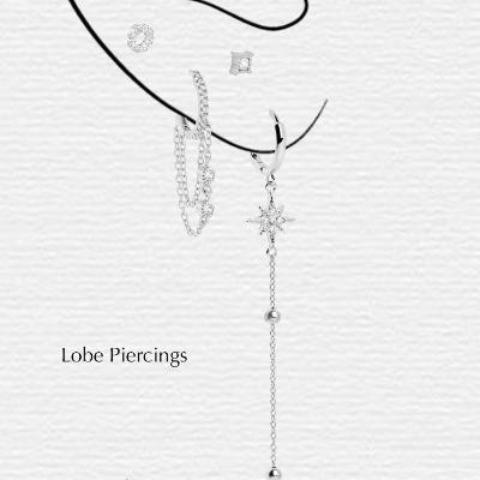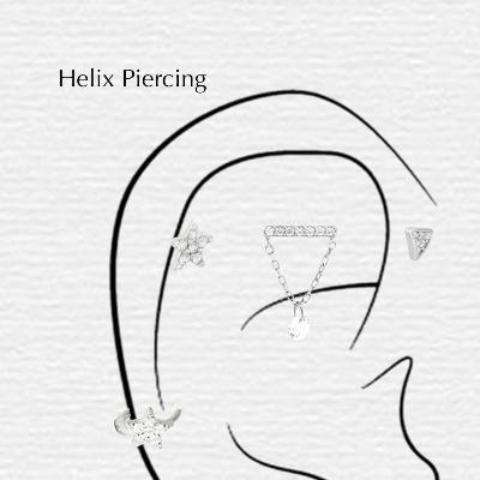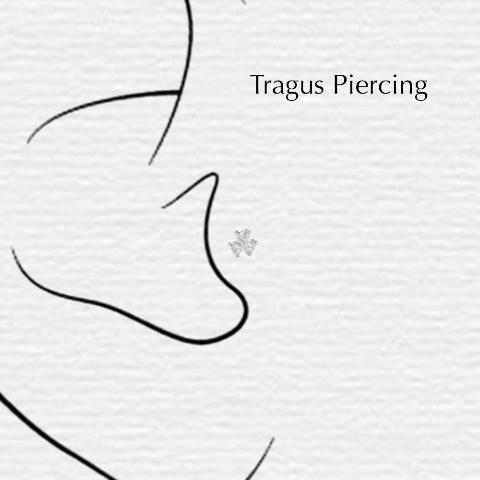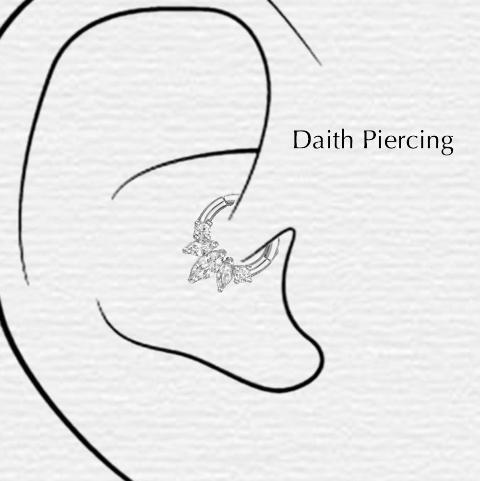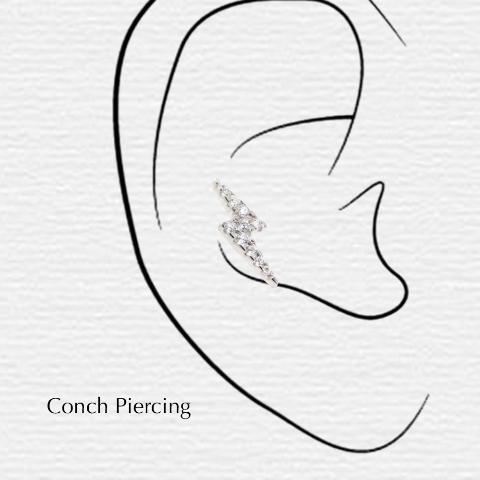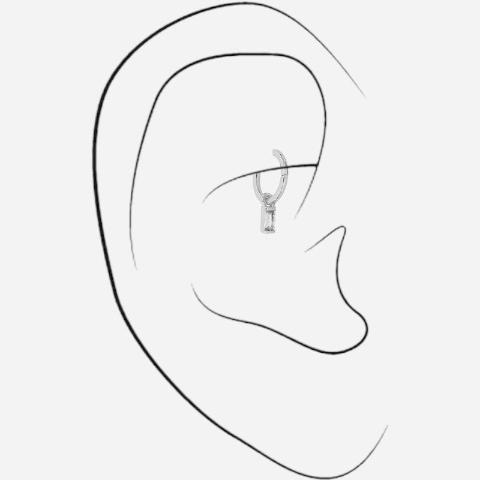Daith Piercing: Healing Time and Care Guide
The daith piercing has gained popularity in recent years for its unique placement in the innermost fold of the ear cartilage. Known for its aesthetic appeal and potential for migraine relief (though scientific evidence is limited), the daith piercing requires proper care during the healing process to ensure optimal healing and minimize the risk of complications. If you're considering getting a daith piercing or have recently had one, here's a guide to help you understand the healing timeline and how to take care of it properly.
Healing Time:
The healing time for a daith piercing can vary from person to person. On average, it takes about 3 to 6 months for a daith piercing to fully heal. However, it's important to note that healing times can be influenced by factors such as individual anatomy, overall health, aftercare practices, and lifestyle habits. It's crucial to be patient and follow proper aftercare guidelines to promote a successful healing process.
Initial Aftercare:
After getting your daith piercing, your piercer will provide specific aftercare instructions. However, here are some general guidelines to keep in mind:
1. Cleanliness: Always wash your hands thoroughly with soap and water before touching your daith piercing. This helps minimize the risk of introducing bacteria to the piercing site.
2. Cleaning Solution: Use a saline solution or a mixture of non-iodized sea salt and warm distilled water to clean your daith piercing. You can either purchase a sterile saline solution from a reputable piercing or drugstore, or make your own saline solution by dissolving 1/4 teaspoon of non-iodized sea salt in 8 ounces of warm distilled water. Soak a clean cotton ball or a sterile saline spray with the solution, and gently clean around the piercing.
3. Avoid Irritants: During the healing process, it's important to avoid irritants that can hinder healing or cause infection. Keep hair products, perfumes, and cosmetics away from the piercing area, as they can introduce bacteria or chemicals that may irritate the piercing.
4. Be Gentle: Refrain from touching, twisting, or playing with the jewelry in your daith piercing. Excessive movement can disrupt the healing process and lead to irritation or complications.
5. Clothing and Bedding: Choose clothing that won't snag or irritate your daith piercing. Opt for loose-fitting garments, particularly around the head and ear area. Additionally, use clean and soft bedding materials to minimize friction and discomfort while sleeping.
6. Avoid Swimming: It's best to avoid swimming in pools, hot tubs, and natural bodies of water until your daith piercing is fully healed. These environments can introduce bacteria and increase the risk of infection.
Ongoing Care:
Once your daith piercing has healed, it's important to continue caring for it to maintain its health and prevent issues. Here are some tips for ongoing care:
1. Regular Cleaning: Clean your daith piercing once a day or as needed with a saline solution or mild soap and water. Gently remove any crust or buildup around the jewelry and rinse thoroughly.
2. Jewelry Maintenance: Ensure that the jewelry in your daith piercing remains clean and free from debris or buildup. Gently rotate the jewelry while cleaning to prevent it from sticking to the surrounding tissue.
3. Be Mindful of Headphones and Earphones: Avoid wearing tight or heavy headphones or earphones that may put pressure on or irritate your daith piercing. If necessary, opt for over-ear headphones or earphones that don't touch the piercing directly.
4. Check for Signs of Infection: Regularly inspect your daith piercing for signs of infection, such as excessive redness, swelling, persistent pain, or abnormal discharge. If you notice any of
these symptoms, seek medical attention promptly.
Remember, everyone's healing process is unique, and it's important to listen to your body. If you have any concerns or questions during the healing period or after, don't hesitate to reach out to your piercer or a medical professional for guidance and assistance.
The daith piercing has gained popularity in recent years for its unique placement in the innermost fold of the ear cartilage. Known for its aesthetic appeal and potential for migraine relief (though scientific evidence is limited), the daith piercing requires proper care during the healing process to ensure optimal healing and minimize the risk of complications. If you're considering getting a daith piercing or have recently had one, here's a guide to help you understand the healing timeline and how to take care of it properly.
Healing Time:
The healing time for a daith piercing can vary from person to person. On average, it takes about 3 to 6 months for a daith piercing to fully heal. However, it's important to note that healing times can be influenced by factors such as individual anatomy, overall health, aftercare practices, and lifestyle habits. It's crucial to be patient and follow proper aftercare guidelines to promote a successful healing process.
Initial Aftercare:
After getting your daith piercing, your piercer will provide specific aftercare instructions. However, here are some general guidelines to keep in mind:
1. Cleanliness: Always wash your hands thoroughly with soap and water before touching your daith piercing. This helps minimize the risk of introducing bacteria to the piercing site.
2. Cleaning Solution: Use a saline solution or a mixture of non-iodized sea salt and warm distilled water to clean your daith piercing. You can either purchase a sterile saline solution from a reputable piercing or drugstore, or make your own saline solution by dissolving 1/4 teaspoon of non-iodized sea salt in 8 ounces of warm distilled water. Soak a clean cotton ball or a sterile saline spray with the solution, and gently clean around the piercing.
3. Avoid Irritants: During the healing process, it's important to avoid irritants that can hinder healing or cause infection. Keep hair products, perfumes, and cosmetics away from the piercing area, as they can introduce bacteria or chemicals that may irritate the piercing.
4. Be Gentle: Refrain from touching, twisting, or playing with the jewelry in your daith piercing. Excessive movement can disrupt the healing process and lead to irritation or complications.
5. Clothing and Bedding: Choose clothing that won't snag or irritate your daith piercing. Opt for loose-fitting garments, particularly around the head and ear area. Additionally, use clean and soft bedding materials to minimize friction and discomfort while sleeping.
6. Avoid Swimming: It's best to avoid swimming in pools, hot tubs, and natural bodies of water until your daith piercing is fully healed. These environments can introduce bacteria and increase the risk of infection.
Ongoing Care:
Once your daith piercing has healed, it's important to continue caring for it to maintain its health and prevent issues. Here are some tips for ongoing care:
1. Regular Cleaning: Clean your daith piercing once a day or as needed with a saline solution or mild soap and water. Gently remove any crust or buildup around the jewelry and rinse thoroughly.
2. Jewelry Maintenance: Ensure that the jewelry in your daith piercing remains clean and free from debris or buildup. Gently rotate the jewelry while cleaning to prevent it from sticking to the surrounding tissue.
3. Be Mindful of Headphones and Earphones: Avoid wearing tight or heavy headphones or earphones that may put pressure on or irritate your daith piercing. If necessary, opt for over-ear headphones or earphones that don't touch the piercing directly.
4. Check for Signs of Infection: Regularly inspect your daith piercing for signs of infection, such as excessive redness, swelling, persistent pain, or abnormal discharge. If you notice any of
these symptoms, seek medical attention promptly.
Remember, everyone's healing process is unique, and it's important to listen to your body. If you have any concerns or questions during the healing period or after, don't hesitate to reach out to your piercer or a medical professional for guidance and assistance.
